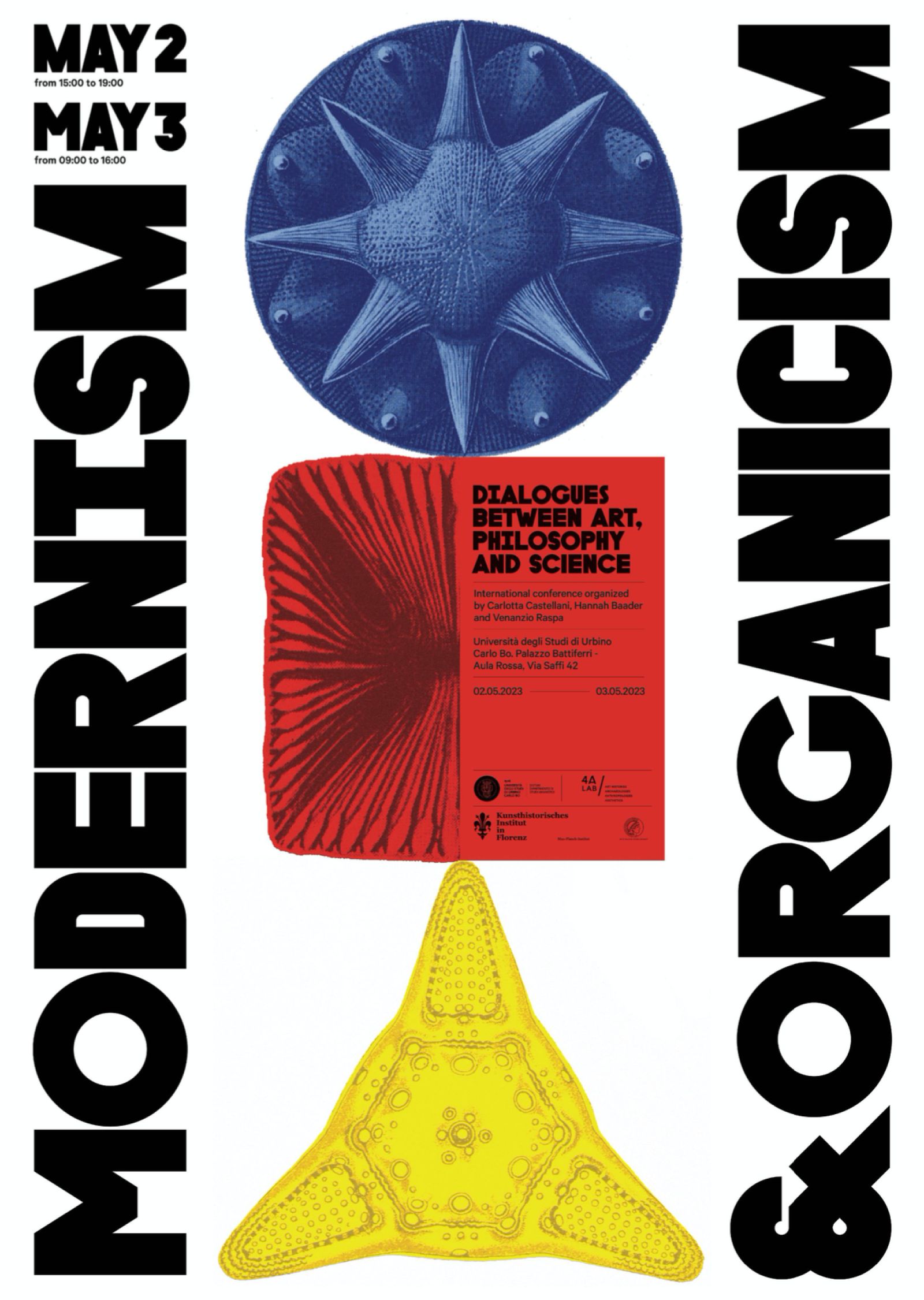Conference
Modernism and Organicism: Dialogues between Art, Philosophy and Science
International conference organized by Carlotta Castellani, Hannah Baader and Venanzio Raspa
Università degli Studi di Urbino Carlo Bo e Kunsthistorisches Institut in Florenz – Max-Planck-Institut

At the beginning of the twentieth century, Western philosophical concepts of nature and life gradually grew to become all-encompassing categories of intellectual thought, thus offering a philosophical bridge between the sciences [Naturwissenschaften] and humanities [Geisteswissenschaften]. The Organicist discourse, particularly its German variation, sought to address major problems of biological thought, e.g., the antithesis of mechanism versus vitalism. Specificity in the organization and configuration of biological form [Gestalt and Gestaltung] could be identified in numerous phenomena in nature, at all levels, from the cellular to the macrocosmic.
From this perspective, humankind, like all organisms, constitutes only an element within a complex system of relationships. The relationship between the living organism and its environment [Umwelt] is thus one of incessant reciprocity. Notional categories such as Energy, Energeticism, and Rhythm became central expressions of the life processes and were explored in the philosophical concepts and scientific theories of scholars such as Ernst Haeckel, Ludwig Klages, Wilhelm Ostwald, and Jacob von Uexküll, who among others promoted a direct link between the life sciences to other areas of knowledge production.
What united these theories was a universal rejection of biological reductionism and an emphasis on the organism as a unit of interrelated elements, according to the principle of “the whole is more than the sum of its parts.” After the First World War, these ideas were carried forward by numerous intellectuals and artists, who were closely following contemporary debates in the natural sciences.
The conference aims at providing new insights into our understanding of Organicism as an epistemological model in European modernism of the 1920s. Particular focus is on the dialogue between art, science, and philosophy. It will be shown that scientific debates and their popularization had a profound effect upon contemporary philosophical discussions and vice versa. Artistic production was informed by scientific discoveries; artists drew on scientific insights and responded to science on multiple levels. Thus, Organicism can be understood as a pivotal concept in the formulation of new theories of color, architectural design, photographic and cinematic vision, Gestalt theory, and the phenomenology of perception.
The two-day conference consists of five panels, each devoted to a philosopher or scientist who contributed – in various ways – to the formation of these theories: Ernst Haeckel, Ernst Marcus, Wilhelm Ostwald, and Gestalt theorists such as Kurt Koffka, Wolfgang Köhler, and Max Wertheimer. Two different research perspectives (art history/philosophy) will will applied, in dialogue with each other, around these figures with the ambition to present the scientific theories and discuss their interaction through specific case studies from the art-historical field (such as Hannah Höch, Viking Eggeling, Hans Richter, Theo van Doesburg, Làszló Moholy-Nagy, Raoul Hausmann, El Lissitzky, and others),
The goal of the conference is to investigate the concept of organicism as an epistemological model in art, photography, architecture and experimental cinema, by experimenting with new methodological formats of interdisciplinary inquiry.
The conference is part of the initiatives of the Department of Humanities of the University of Urbino (DISTUM) - Department of Excellence 2023- 2027 – in collaboration with the research program 4A_Lab based in Berlin, a cooperation between the Kunsthistorisches Institut in Florenz – Max-Planck-Institut and the Stiftung Preußischer Kulturbesitz.
Scientific committee: Hannah Baader, Oliver A. I. Botar, Carlotta Castellani, Venanzio Raspa, Isabel Wünsche.
Program
May 2, 2023
Chair: Caterina Caputo, Università degli Studi dell'Aquila
15.00 Berta Martini, Università degli Studi di Urbino Carlo Bo, Institutional greetings
15.15 Carlotta Castellani, Hannah Baader and Venanzio Raspa, Welcome and Introduction
15.30 Oliver A.I. Botar, University of Manitoba, Introductory note: The Fin-de-Siècle Neo-Romantic Revival and its Emergence into Early-20th Century Biozentrik
16.15
Valeria Maggiore, Università degli Studi di Palermo: A romantic Biologist: Ernst Haeckel between Art and Science
Hannah Baader, Kunsthistorisches Institut in Florenz, Max-Planck-Institut: Umwelt, Bedeutungslehre and the Berchtesgaden Alps
17.45 Coffee break
18.00 Michael Zimmermann, Universität Eichstätt, Keynote: L’evoluzione ripetuta nell'esperienza interiore dell’artista. Gustave Flaubert e Odilon Redon (in Italiano)
May 3, 2023
Chair: Federico Boem, University of Twente
9.00
Venanzio Raspa, Università degli Studi di Urbino Carlo Bo: Ernst Marcus and the Knowledge of the External World
Arndt Niebisch, Universität Wien: Transcendental Extensions. Raoul Hausmann on the Condition of the Possibility of Perception and Media
10.30 Coffee Break
11.00
Tatjana Petzer, Karl-Franzens-Universität Graz: Wilhelm Ostwald’s Energetics and the Aesthetics of Transformation
Isabel Wünsche, Constructor University, Bremen: Wilhelm Ostwald and Psychic Energies in Color Design
13.00 Lunch
14.00
Fiorenza Toccafondi, Università degli Studi di Firenze: Gestalt and Gestaltung
Carlotta Castellani, Università degli Studi di Urbino Carlo Bo: From Rhythm to Gestaltung in Abstract Film
15.30: Closure Round table
Selected Bibliography
Linda Dalrymple Henderson. Writing Modern Art and Science – An Overview; Science in Context 17(4), 423–466 (2004).
Beyond Art: A Third Culture: A Comparative Study in Cultures Art and Science In 20th Century Austria and Hungary, ed. by Peter Weibel, Springer, Vienna 2005.
Biocentrism and Modernism, ed. by Oliver A.I. Botar and Isabel Wünsche, Routledge, London-New York 2011.
The Routledge Companion to Biology in Art and Architecture, ed. by Charissa N. Terranova and Meredith Tromble, Routledge, New York-London 2017.
Vitalism and Its Legacy in Twentieth Century Life Sciences and Philosophy, ed. by Christopher Donohue and Charles T. Wolfe, Springer, 2023.
Downloads
02 – 03 May 2023
Urbino, Palazzo Battiferri - Aula Rossa, Via Saffi 42
This will be a hybrid event. Please register here to attend online: https://uniurb-it.zoom.us/webinar/register/WN_VgBXk2HNTy-gzUzUO7ujkw
Notice
This event will be documented photographically and/or recorded on video. Please let us know if you do not agree with the Kunsthistorisches Institut in Florenz using images in which you might be recognizable for event documentation and public relation purposes (e.g. social media).


